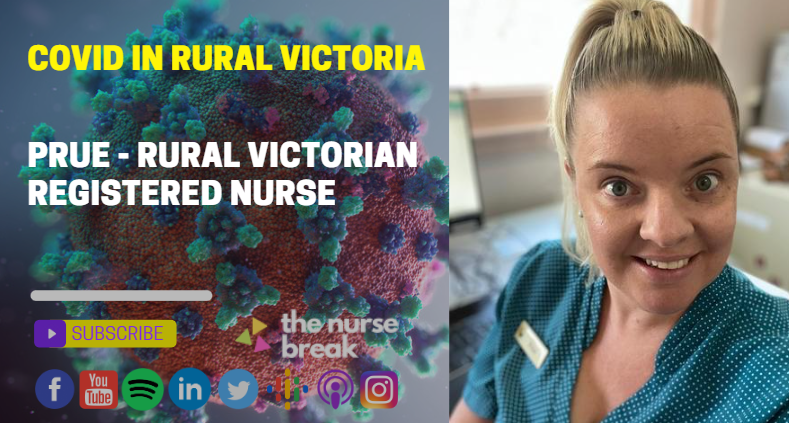Table of Contents
The Nurse Break recently held a very popular Nursing During COVID / Pandemic 2021 Writing Competition. We were inundated with submissions and thank everyone. By Prue, RN in Rural Victoria. To get notified of future competitions and content, sign up here.
To read articles about nurses’ raw experiences during COVID19 go here. To write for The Nurse Break go here
COVID in Rural Victoria
Being a Registered Nurse in a small rural Victorian Health Service admittedly comes with a multitude of challenges – a real inability to recruit; leading to staff shortages and burnout, a severe lack of health professionals and specialists and increased workload and stress related to the fact that even getting hold of the local GP can be difficult at times! But throw in a pandemic and, well, let’s just say that it adds to an already challenging job!
Don’t get me wrong, I love my job and there are so many positive aspects to working in a small health service – increased autonomy and the ability to build and use a broad knowledge base and clinical skills that those working “just” on a specialist inpatient ward don’t necessarily use.
The opportunity to work in a team that just “get it”, a team who I can call not just colleagues, but good friends – by far the reason why we have not survived, but thrived in the current COVID-19 pandemic. Nursing is a team role and we have certainly needed to use that to our advantage here!
In most (larger) health organisations, you have resources, here we do not. In the initial stages of COVID19 the introduction of swabbing clinics began – to test symptomatic patients, asymptomatic close contacts, returned interstate travellers and transport (amongst other) workers who required twice weekly testing in order to cross state borders – require people to actually run them.
Here we complete our testing clinics whilst there are “double staff “on shift – this takes 2 or 3 staff off the floor and leaves 2 staff attending to the patients on the acute ward and also covering any urgent care centre patients that present for assessment. At times, this could mean swabbing as many as 20 people, which could take up to 45 minutes – adding to stress for both nursing staff and patients (remembering there are no Doctors in the hospital in rural areas!).
With a local scare in our tiny town of less than 3000 people from some positive cases, the need to conduct a few days of all-day swabbing clinics were run by – you guessed it, the same staff that run everything else!
This was a massive effort by all staff at the health service, not just the nursing staff, requiring administration, domestic, management and other non-clinical staff to run smoothly. Definitely one of those moments where you really do feel proud of your workplace.
Moving further into the pandemic – vaccine clinics began. An enormous community event ran yet again by the same aforementioned staff. In the past 12 months a number of RN’s completed their vaccination qualifications so they could assist in ensuring our community get vaccinated.
I think it’s the role of a nurse to go above and beyond for our patients but this pandemic really took things to the next level. Those at our tiny health service – my amazing colleagues – really showed that health is all about community. They pushed themselves to be better nurses to ensure everyone’s safety. Florence Nightingale continues to ring true in so many ways – even in modern nursing where many of her ideas are no longer considered “current.”
But let’s be honest, it doesn’t get much more accurate than this…“Let us never consider ourselves finished nurses.. We must be learning all of our lives.”
I think it’s also important to mention the subject of fear when discussing pandemic nursing – something that probably all of us have experienced over the past 2 years.
What started out as the unknown left nurses on the forefront, listening to different and ever changing guidelines around the most appropriate PPE to prevent transmission of COVID19… then feeling so horribly sad for our colleagues in both Australia and around the world as they dealt with containing the spread – with many contracting the virus that changed our profession forever.
Again, Florence simply nails it – “So little can be done under the spirit of fear.”
So, again – nursing in a pandemic, though challenging has brought out such spirit and camaraderie in our profession. It has forced us to remember why we became nurses – because we care – whilst also enabling us to rise against many obstacles and make ourselves better people and community members along the way. And if this doesn’t ring true to my many colleagues near and far…well, I suggest you try rural nursing!





